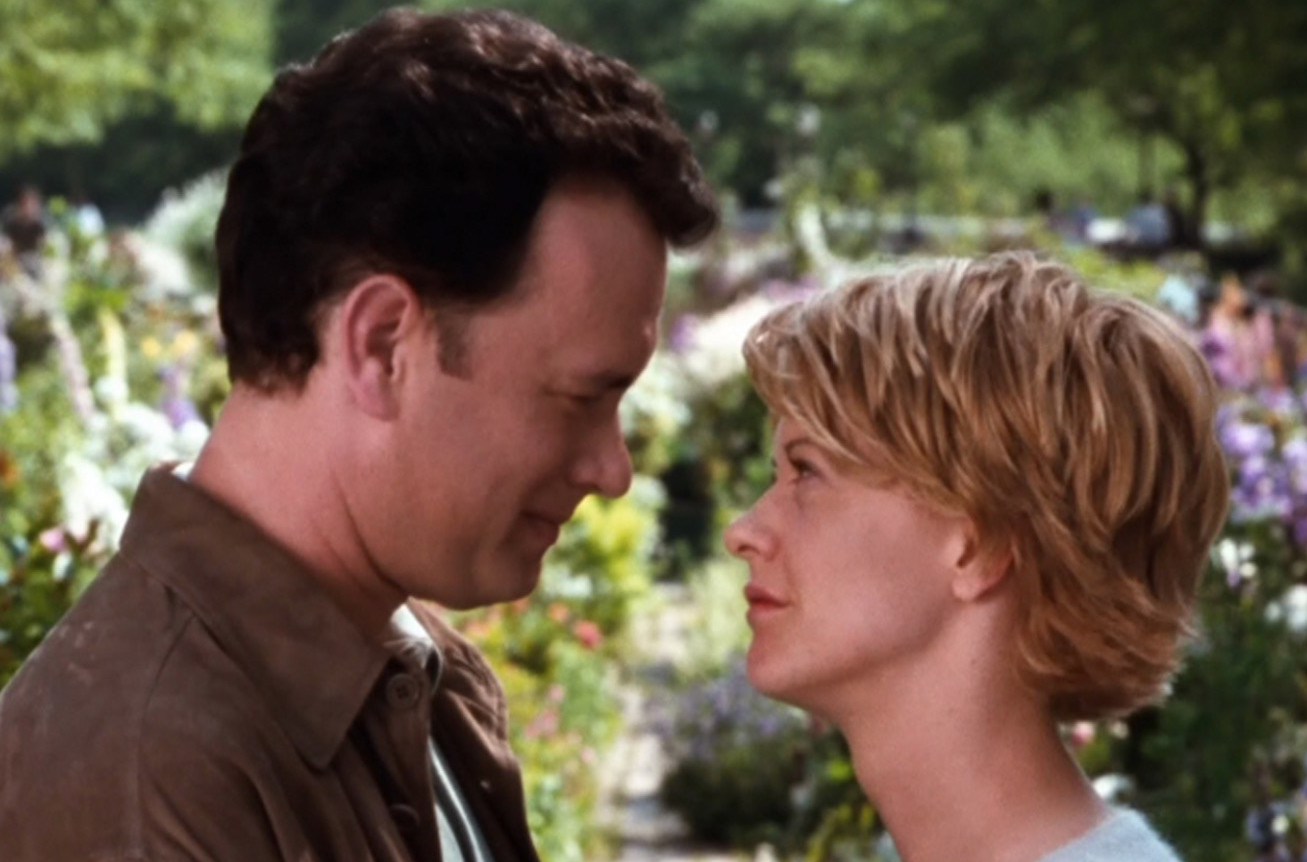I own three copies of the movie “You’ve Got Mail.” One VHS, one DVD and one Blu-Ray, all purchased in different decades when each medium was the most prescient. A new copy for each president that has taken office since the movie’s initial release in 1998, the unsteady trek into the future tethered by a Nora Ephron-directed romcom about the internet.
Now, because it’s 2019 and the entire planet is just vapor in a cloud owned by Jeff Bezos, I stream the movie on Amazon.
I don’t necessarily have a deep attachment to many movies that came out when I was a 1-year-old, but “You’ve Got Mail” is the exception. If I were made to watch all 119 minutes of “You’ve Got Mail” on loop for eternity with my eyes pried open “A Clockwork Orange”-style, I would probably be fine with that. If a meteor was hurtling toward Earth and I was told I only had an hour and 59 minutes to live, I would not reach out to family or friends. I would turn off my phone, bunker down the doors and windows to minimize distraction and spend my last minutes on this planet watching “You’ve Got Mail.”
And yet, even as someone who’s committed swaths of the film’s dialogue to memory, who owns a CD copy of the official soundtrack, even as a super fan/devotee, I must admit: Two decades later, the plot of “You’ve Got Mail” has not aged well.
The movie stars Meg Ryan as Kathleen Kelly, the owner of a children’s bookshop called The Shop Around the Corner. Using the AOL screenname Shopgirl (this was the ’90s, after all) in an over-30s chatroom, Kelly has become involved in an intense correspondence with a user called NY152.
Here enters Joe Fox (Tom Hanks) — the Mars to her Venus, the Goliath to her David, the NY152 to her Shopgirl — who runs the mega-bookstore chain opening a location just around the corner from The Shop Around the Corner. The movie unfolds as the dual relationships develop: Kelly and Fox as book-selling enemies, Shopgirl and NY152 as AOL pen pals falling in love. The whole thing culminates in a sweeping scene where, having finally revealed their online alter-egos, they kiss in the middle of Central Park while Harry Nilsson’s version of “Over the Rainbow” swells in the background. It is delightful.
But, of course, watching “You’ve Got Mail” in a revisionist context 20 years later reveals cracks in its foundation. In an article published by The Atlantic on the film’s 20th anniversary, Megan Garber presents the argument that “Joe, the scion of the Fox family, and thus the partial owner of the big-box Fox Books, and thus the enemy of the independent-bookstore-owning Kelly—is, objectively, kind of a jerk.” Garber then goes on to present, with prosecutor-like precision, the evidence, with a list of Fox’s offenses throughout the movie.
The most incriminating, however, lies in the fact that Fox uncovers the online identities before Kelly does. The discovery leads Fox to devise scheme after scheme in order to pursue Kelly, using the information she unknowingly divulges to him in the chatroom to his advantage. This is all done to convince Kelly that even though he had destroyed her business and belittled her existence multiple times throughout the movie, he was the one for her.
Of course, this is all done under the glimmering sheen of a romantic comedy. But still, the narrative of a very powerful man manipulating a woman until she bends to his will is not particularly charming or compelling in the present day.
On top of that, the movie puzzlingly features several scenes of Kelly going to Starbucks despite her being a champion of the small business against the heartless giant corporation. Add to this the fact that Dave Chappelle appears in the movie as the one person of color in a significant role, and even then, there isn’t much definition to him other than “Joe’s Friend.”
Despite all of this, modern audiences still love “You’ve Got Mail.” It is regarded as a gold standard for the romantic comedy, as a film expected to be revered by anyone with a pulse and a functioning heart muscle.
The movie has inspired a deep well of tributes in just the past couple years. “Why Anyone With A Soul Loves ‘You’ve Got Mail,'” proclaims BuzzFeed. Bustle compiled “11 Romantic Books To Read If ‘You’ve Got Mail’ Is Your All-Time Favorite Rom-Com” for anyone who wants to take their devotion to the movie across mediums. Even writers intending to revisit the film in a modern context can’t help themselves. A piece on Refinery29 asks, “You’ve Got Mail: Best Film Ever Or Deeply Problematic?,” as if it could only exist as one or the other.
As any movie built around an AOL chatroom would be, “You’ve Got Mail” is a distinct product of a particular period of time, and the characteristics of this era permeate almost every aspect of the movie. Twenty years on, it’s hard not to notice everything that makes the movie feel so dated. So then why, to this day, do people still love “You’ve Got Mail”?
Romantic comedies have always been built on fantasy, and “You’ve Got Mail” epitomizes this. At the start of the movie, Kelly owns a successful bookstore that specializes in children’s books (which, in real life would be a miracle) and lives in a spacious and beautiful brownstone on the Upper West Side (which, in real life would be an even bigger miracle). She also displays very little financial anxiety when her store, which is her only source of income, closes.
The movie also tends to treat and treasure the internet as a wonderland full of connective potential, rather than the murky techno-abyss it can be understood as today. The plot depicts a type of charming online naïveté that would now be viewed as lunacy. But, the hook of two people meeting in an anonymous chatroom, on which the film’s entire love story lies, is a plotline that modern audiences would expect to most likely end in a scam, robbery or murder. In “You’ve Got Mail,” it takes about half the film’s runtime for any of the characters to even float the idea to Kelly that NY152 might be a serial killer. A world where that is not your first thought is pure, blissful fantasy.
Most of all, “You’ve Got Mail” presents a reality where, despite obstacles, roadblocks and slow dial-up speeds, true love is a thing that can be found, understood and conquered in two hours or less.
Nearly everything about the two decades since “You’ve Got Mail” was released has been untenable. As the movie splices in shots of the New York skyline, the Twin Towers are still standing. Maybe this is the reason behind the enduring, essential appeal of “You’ve Got Mail,” that as much as the world outside of it changes, the lives of Fox and Kelly will forever remain frozen in time. But even divulging in fantasy can feel disquieting. Watching the movie today, it feels nearly irresponsible to allow myself to be swept away so entirely by a plot that, were it to be made today, would feel remarkably out of place.
Although, it’s equally possible I’m doing the movie a disservice in trying to dissect it in this manner. Hollywood knows better now than to make a movie like “You’ve Got Mail,” and I know better than to fall head over heels for it in the same way. “You’ve Got Mail” is not meant as a thought-provoking or accurate depiction of the world as it is today. As it was 20 years ago and remains through the present day, “You’ve Got Mail” is best enjoyed as nothing more than a glittering, effusively warm embrace of perfectly choreographed romance.
















